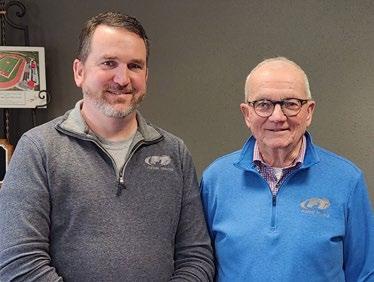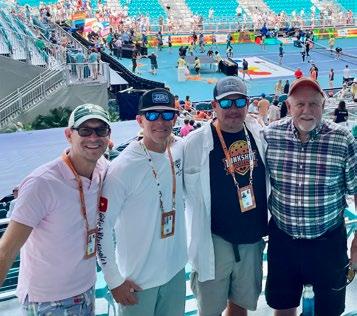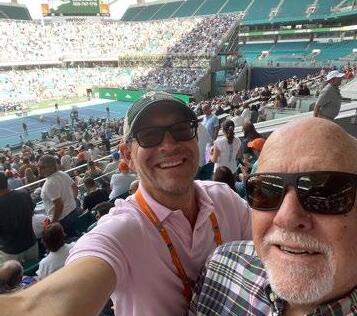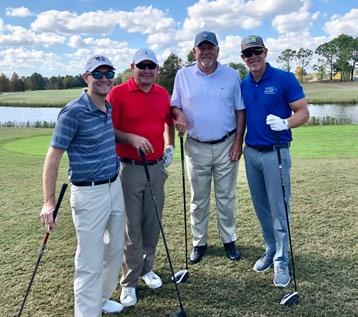
3 minute read
FEATURED ARTICLES
ASBA’s Multi-Generational Member Companies: Keeping It All in the Family continued
we’re into the third generation.”
Currently, Rob serves as president of the company, Bill as treasurer, and sons Jake (director of sales and marketing) and Joe (logistics) complete the circle.
Another longtime member company (who moved into this industry from another) is American Athletic Track and Turf in Vincentown, New Jersey.
“We had experience in roadway construction and asphalt paving,” says Lee Narozanick. “Having paved tennis and basketball courts, running tracks and roadways growing up, William Narozanick, president, who had just left his tenure at Burlington Asphalt Corp. thought staying with his strengths would be a good business model. It turned out to be a very good decision.”
The Evolution of Family Companies
Rick Burke of Chattanooga, Tennessee-based NGI Sports worked on the supplier side for a number of years before starting his own company, where other family members, including two sons, David and Mike, now also work.
“Working with your family is good,” says Burke. “It takes the pressure off you. You have people you can depend on, people you trust.”
In many cases, he adds, having a younger generation involved can drive innovation. His company has diversified over time, moving from synthetic turf to overlay systems for tennis and pickleball courts, and is exploring the padel market as well. Sometimes, he says, letting go of the reins and allowing a younger generation to take the lead can pay dividends.
“You might think that nobody can do it the same as way you and of course, that is true. But once you start giving responsibility away, you discover that although someone may do something differently, it can still lead to something really good.”
Corey Hardick of CH Court Tech, Inc. in San Diego would second that. Hardick grew up watching his father, an electrician, at work, and that work often included installing lights at tennis courts. On the weekend, Hardick and his brother would assist.
“I was hanging lights when I was 10 or 11 years old,” he laughs.
An interest in the construction of courts brought him into the industry, where he invited his brother to join the company he had founded. Three decades later, his son has joined the family business as well.
“There are so many good things about a family business,” he says, “but I would say the best part is you’re so in tune with one another. You know your family has your back. You don’t have to explain things as much.”
Hardick brings his son to ASBA meetings “because I want him to as much knowledge as I am accessible to.”
“My dad was a firm believer in membership in trade organizations,” says Narozanick, who is an active member of ASBA. “He used to say, that you only get out of an organization what do you put into the organization.”
Robert Cohen of Bernalillo, New Mexico started his own company, Robert Cohen Co., LLC, on the heels of being a partner in a tile contracting firm. His purpose in starting the new company, he said, was “bidding and performing three projects as a sports builder. The intent was to complete those three projects and then get out of construction for good, but I got sucked in once again.”
The company retains its status as a sole proprietorship but these days, Bob’s son, Maxwell, is working as vice president and director of special projects, and attends the Technical Meeting with his father.
Advantages and Disadvantages
The sports facility construction and supply industry is unique, and working with family can add a layer of complexity, as well as plenty of rewards.
“You don’t have to work in a corporate setting,” says Pete Smith. “You have independence. And when it’s a family company, the relationships are special: my partner is always my brother and we’ll always be brothers. Mike and I know each other better than anyone but that can be good or bad.”
“With family involved, the interpersonal dynamics can spill into the workplace and workplace disagreements can spill into family time,” adds Bob Cohen.
Sam Fisher of Fisher Tracks, Inc. in Boone, Iowa, says family members tend to be a little harder on one another than they might be with an outside employee.

“It’s one of the drawbacks of managing family,” he says. “On the other hand, it’s your craft, it’s your family’s craft and you all care about it.”
Being invested emotionally in a company is something familiar to Todd Dettor of Fast-Dry Courts, Inc. & 10-S Tennis Supply in Pompano Beach, Florida, and it is just one thing he considers an advantage.



“There’s trust in leadership, building a legacy for future generations and some autonomy and flexibility in work schedules. It is also nice to understand the history of the industry so as not to make the same mistakes twice. It is also worthwhile noting that many of our team members are like family as they have been with us for so many years and quite frankly, have seen us all grow up. These team members are just like brothers to me.”
Company succession planning also can be complicated, should multiple family members work together.
“There is one rule that is a must for success,” says Rob Righter. We are not allowed to discuss work if we get together on weekends or family occasions.”
Continues on page 22...





